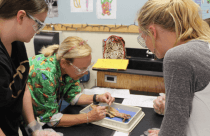Dealing with Bad Student–Advisor Relationship

The advisor–graduate student relationship can a tricky one. When it is good, it’s really good. But when it’s bad, it can negatively impact the grad student’s career, and in some cases, the advisor’s as well.
So what is that rule of thumb when it comes to dealing with bad student–advisor relationship during your PhD? How do you avoid having the relationship go bad? And what do you do if it starts to head that way?
The short answer is: COMMUNICATION
Plan Ahead for Success
Advisors: If you are the advisor, consider creating a handout that you give your grad students when they begin their work under you. This handout can give the grad students a clear idea of what they are expected to do and what they can expect from you.
- Will you check in with them once a month or is it their responsibility to reach out to you?
- Do you require that they complete their dissertation in a certain time frame or are you comfortable with flexible due dates and milestones?
Knowing these things ahead of time will help grad students stay on track.
Grad students: If your advisor doesn’t initiate this conversation early in your time with him or her, you should broach the subject on your own. The dissertation process can be long and arduous and an advisor who is top in his field might not be the best person for you to work with.
If your relationship with your advisor fails and makes it difficult or even impossible for you to finish your dissertation, was he or she really the “best” advisor for you?
Deal with Problems Immediately
Problems in the relationship should be addressed as soon as they appear. For instance, if the grad student feels insecure about the advisor’s opinion of their work, they must be prepared to speak with their advisor about it.
The advisor, in turn, should be honest: if they see a problem with the student’s research or writing, they must explain the issue to the student and be clear about the seriousness of the problem. But, if the advisor does not see a problem, they should be very clear that they support the grad student.
But what happens when it goes really bad?
- Perhaps you had a falling out over research methods and it has gone beyond a simple professional disagreement
- Maybe the grad student has tried to get in touch with the advisor repeatedly with no response and is therefore having to delay graduation
If the advisor can no longer work with the student, the student should be informed of this as soon as possible in order to avoid wasting further time and money on their degree!
Seek Outside Support
If the grad student feels they can no longer work with their advisor, they should seek advice from another senior faculty member as to how to address the situation.
In some cases, early enough in the process, grad students can be shifted to another advisor, but that often isn’t possible. When a grad student decides to end the relationship with their advisor, it may be a career-ending decision!
If even the dissertation is finished under another supervisor, the original relationship can potentially poison the future of the student’s academic career. Therefore, grad students should not rush into ending a relationship with their advisor, and if they must, should do so only with guidance from another faculty member.
In either case, if your grad student–advisor relationship is the source of what seems like more than the typical amount of anxiety, the best way to deal with the problem is to address it (with tact and care) directly and as quickly as possible, which provides the best hope for the mending the relationship.









